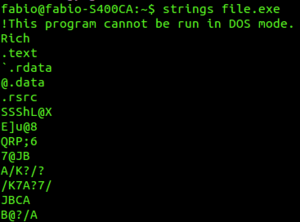strings (Unix)
In computer software, strings is a program in Unix and Unix-like operating systems that finds and prints text strings embedded in binary files such as executables. It can be used on object files and core dumps.
 The strings command | |
| Operating system | Unix, Unix-like, Inferno |
|---|---|
| Type | Command |
Overview
Strings are recognized by looking for sequences of at least 4 (by default) printable characters terminating in a NUL character (that is, null-terminated strings). Some implementations provide options for determining what is recognized as a printable character, which is useful for finding non-ASCII and wide character text.
Common usage includes piping its output to grep and fold or redirecting the output to a file.[1]
It is part of the GNU Binary Utilities (binutils), and has been ported to other operating systems including Windows.[2]
Example
Using strings to print sequences of characters that are at least 8 characters long (this command prints the system's BIOS information; should be run as root):
dd if=/dev/mem bs=1k skip=768 count=256 2>/dev/null | strings -n 8 | less
See also
References
- Kiddle, Oliver; Jerry Peek; Peter Stephenson (2005). From Bash to Z Shell. New York, NY: Apress. p. 413. ISBN 978-1-590-59376-9. OCLC 57450917.
- cygwin
External links
| The Wikibook Guide to Unix has a page on the topic of: Commands |
- – Commands & Utilities Reference, The Single UNIX Specification, Issue 7 from The Open Group